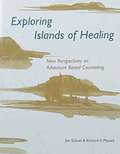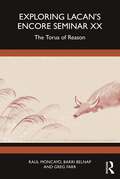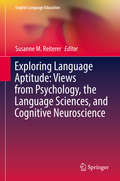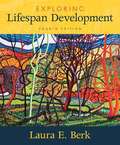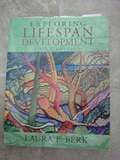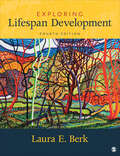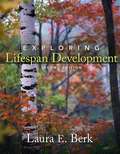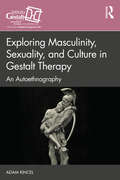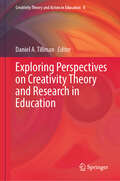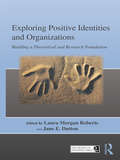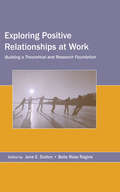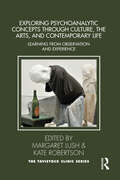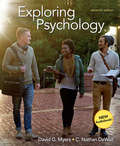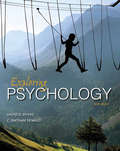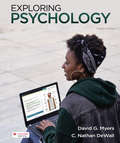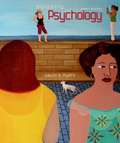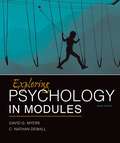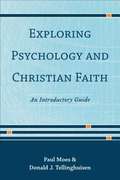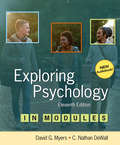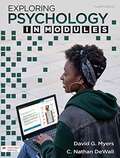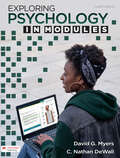- Table View
- List View
Exploring Intimacy: Cultivating Healthy Relationships through Insight and Intuition
by Suzann Panel RobinsBuilding off the idea that when we are happier, we tend to be healthier, Robins explains the phenomenon of how our intuitive knowing fosters healthy relationships that contribute to our physical, mental, and emotional health. Readers learn to utilize a variety of pathways that will change their responses to others and will produce lasting, more rewarding, and closer relationships in all areas of their lives. This book is designed to aid readers in looking inward and experiencing how their intuitive sixth sense informs their ability to be intimate without the negative triggers of past experiences. Through a considered and thoughtful approach, Robins offers insight into cultivating a truly integrated self so that one may lead a more fulfilling and healthful life.
Exploring Islands of Healing: New Perspectives on Adventure Based Counseling
by Jim Schoel Richard S. MaizellA fresh look at Adventure Based Couseling. This book examines some new perspectives on the theory and practice of ABC. It is designed to help the practitioner benefit from over a decade of experience and thought building on the original Islands of Healing. <p><p>It includes a new perspective on theory-based activity selection including never-before-published activities and a greatly enhanced assessment process. The Adventure Wave (briefing, doing, debriefing) is re-examined including an in depth look at metaphor development.
Exploring Lacan’s Encore Seminar XX: The Torus of Reason
by Raul Moncayo Barri Belnap Greg FarrExploring Lacan’s Encore Seminar XX examines the themes presented in Encore, the seminar presented by Lacan between 1972 and 1975. Raul Moncayo, Barri Belnap, and Greg Farr focus on Lacan’s presentation of the theory of the Third Jouissance, clarifying the difference between jouissance as a concept and as a word. The authors argue that although there are many words that Lacan uses for jouissance, there are only five concepts of jouissance: the first is inconvenient, the second is convenient and inconvenient, while the last three are convenient and constructive. Exploring Lacan’s Encore Seminar XX will be essential reading for academics and scholars of Lacanian studies, Lacanian analysts, and readers interested in Lacan’s theories of the 1970s.
Exploring Language Aptitude: Views from Psychology, the Language Sciences, and Cognitive Neuroscience (English Language Education #16)
by Susanne M. ReitererThis book presents original, empirical data from quantitative and qualitative research studies in the field of language learning aptitude, ability, and individual differences. It does so from the perspectives of Second Language Acquisition, psychology, neuroscience and sociolinguistics. All studies included in the book use a similar and uniform layout and methodology. Each chapter contains a study examining factors such as memory, personality, self-concept, bilingualism and multilingualism, education, musicality or gender. The chapters investigate the influence of these concepts on language learning aptitude and ability. Several of these chapters analyse hypotheses which have never been tested before and therefore provide novel research results. The book contributes to the field both by verifying and contesting existent findings and by exploring novel approaches to devising research in the subject area.
Exploring Lifespan Development
by Laura E. BerkExploring Lifespan Development, Fourth Edition is also available via Revel(TM), an interactive digital learning environment that is a less expensive alternative to the print textbook, enabling students to read, practice, and study in one continuous experience. Revel's new mobile app lets students access and interact with their text anywhere, anytime, on any device, giving students the flexibility of toggling between their phone, tablet, and laptop as they move through their day.
Exploring Lifespan Development
by Laura E. BerkThis shorter, essentials version of Berk’s best-selling Development Through the Lifespan, 6/e, covers the same topics and contains the same number of chapters, but presents only the essential information with an exceptionally strong emphasis on applications. Exploring Lifespan Development includes all the features Berk’s texts are known for: Engaging writing style, exceptional multicultural and cross-cultural focus, cutting-edge consideration of the interrelationships between heredity and environment, rich examples, the most up-to-date research, and practical applications that help students relate the subject to their personal and professional lives.
Exploring Lifespan Development
by Laura E. BerkNow published by SAGE! Exploring Lifespan Development, Fourth Edition, the essentials version of Development Through the Lifespan, Seventh Edition, by best-selling author Laura E. Berk, includes the same topics, the same number of chapters, and the same outstanding features, with a focus on the most important information and a greater emphasis on practical, real-life applications. The text’s up-to-date research, strong multicultural and cross-cultural focus, along with Berk’s engaging writing style, help students carry their learning beyond the classroom and into their personal and professional lives. Included with this title: LMS Cartridge: Import this title’s instructor resources into your school’s learning management system (LMS) and save time. Don’t use an LMS? You can still access all of the same online resources for this title via the password-protected Instructor Resource Site. Learn more.
Exploring Lifespan Development
by Laura E. BerkNow published by SAGE! Exploring Lifespan Development, Fourth Edition, the essentials version of Development Through the Lifespan, Seventh Edition, by best-selling author Laura E. Berk, includes the same topics, the same number of chapters, and the same outstanding features, with a focus on the most important information and a greater emphasis on practical, real-life applications. The text’s up-to-date research, strong multicultural and cross-cultural focus, along with Berk’s engaging writing style, help students carry their learning beyond the classroom and into their personal and professional lives. Included with this title: LMS Cartridge: Import this title’s instructor resources into your school’s learning management system (LMS) and save time. Don’t use an LMS? You can still access all of the same online resources for this title via the password-protected Instructor Resource Site. Learn more.
Exploring Lifespan Development (2nd edition)
by Laura E. BerkThe book presents the essential information with an exceptionally strong emphasis on applications that help students relate the subject to their personal and professional lives in a manageable and relevant way.
Exploring Masculinity, Sexuality, and Culture in Gestalt Therapy: An Autoethnography (The Gestalt Therapy Book Series)
by Adam KincelExploring Masculinity, Sexuality, and Culture in Gestalt Therapy is an invitation to explore social and political issues within the psychotherapeutic framework. It describes and analyses the author’s journey of becoming a gestalt therapist in Poland and England through analyses of masculinity, sexuality, relationality, and culture. This book addresses the collective gestalts exploring the psychotherapeutic taboos of sexual transference, same-sex attraction, use or lack of touch, gender equality, and inter-cultural conflicts. Each chapter is an exploration of prejudices embedded in our cultures and therapeutic work, and provides a theoretical challenge to current practices within gestalt therapy and beyond. The author advocates for a more collective understanding of embodied sensations emerging in the therapeutic context as collective gestalts. Through the use of autoethnographic research methodology, this book shows how personal embodied experiences are intertwined with the social, political, and material context. It is essential reading for gestalt therapists, as well as readers interested in gestalt approaches.
Exploring Perspectives on Creativity Theory and Research in Education (Creativity Theory and Action in Education #8)
by Daniel A. TillmanCollectively, the sixteen chapters in this book investigate the power of creativity in the classroom, many through the specific lens of limited resources as an opportunity. The chapters are divided into two sections, eight chapters comprising Section I: Theory and Research and then the eight chapters comprising Section II: Additional Perspectives and Future Directions. Within these two sections, the more than two-dozen authors that contributed to this book tackle a wide range of the possibilities for designing creative classroom-based instruction wherein limited resources are highlighted and valued, rather than avoided or lamented. The two main sections of this book are each preceded by a brief introductory summary highlighting those sections’ attributes and objectives, with the intention of providing helpful structure to the reader—but the book has also been designed such that each chapter stands independently and can be jumped to directly like a handbook. In its totality, this book exploring perspectives on creativity theory and research in education is designed to serve as a valuable resource for teachers, teacher educators, school administrators, parents, and education researchers, along with anyone else that is interested in optimizing our opportunities for nurturing creativity within classrooms.
Exploring Positive Identities and Organizations: Building a Theoretical and Research Foundation (Organization and Management Series)
by Jane E. Dutton Laura Morgan RobertsIn the new world of work and organizations, creating and maintaining a positive identity is consequential and challenging for individuals, for groups and for organizations. New challenges for positive identity construction and maintenance require new theory. This edited volume uncovers new topics and new theoretical approaches to identity through the specific focus on positive identities of individuals, groups, organizations and communities. This volume aims to forge new ground in identity research and organizations through a compilation of new frame-breaking chapters on positive identity written by leading identity scholars. In chapters that build theoretical and empirical bridges between identity and growth, authenticity, relationships, hope, sustainability, leadership, resilience, cooperation, and community reputation and other important variables, the authors jumpstart an exciting domain of research on new ways that work organizations are sites of and contributors to identities that are beneficial or valuable to individuals or collectives. This volume invites readers to consider, "When and how does applying a positive lens to the construct of identity generate new insights for organizational researchers?" A unique feature of this volume is that it brings together explorations of identity from multiple levels of analysis: individual, dyadic, group, organization and community. Commentary chapters integrate the chapters within each level of analysis, illuminate core themes and unearth new questions. The volume is designed to accomplish three objectives: To establish Positive Identities and Organizations as an interdisciplinary, multi-level domain of inquiry To integrate a focus on Positive Identity with existing theory and research on identity and organizations To map out a vibrant new research territory in organizational studies . This volume will appeal to an international community of scholars in Management, Psychology, and Sociology, as well as practitioners who seek to generate positive identity-related dynamics, states and outcomes in work organizations.
Exploring Positive Relationships at Work: Building a Theoretical and Research Foundation (Organization and Management Series)
by Building A TheoreticalThis edited volume brings together a select group of leading organizational scholars for the purpose of developing a foundation-setting book on positive relationships at work. Positive Relationships at Work (PRW) is a rich new interdisciplinary domain of inquiry that focuses on the generative processes, relational mechanisms and outcomes associated with positive relationships between people at work. This volume builds a solid foundation for this promising new area of scholarly inquiry and offers a multidisciplinary exploration of how relationships at work become a source of growth, vitality, learning and generative states of human and collective flourishing. A unique feature of the book is the use of a connecting commentator chapter at the end of each section. The Commentator Chapters, written by preeminent scholars, uncover and discuss integrative themes that emerge within sections. The editors approach the topic from multiple levels, each level providing critical, valuable insights into the dynamic process underlying positive relationships at work. These levels are arranged in five parts: an introduction to positive relationships at work; Individuals and Dyads; Groups and Communities; Organizations and Organizing; and a conclusion that offers an engaging invitation and multi-level map for guiding future research. This volume will appeal to academics and practitioners, as well as scholars and graduate students in organizational psychology, management, human resources, and inter-personal communications.
Exploring Psychoanalytic Concepts through Culture, the Arts and Contemporary Life: Learning from Observation and Experience (Tavistock Clinic Series)
by Kate Robertson Margaret LushThis book explores how psychoanalytic ideas and thinking enhance our understanding and engagement with the creative arts and contemporary life.Many of us love to read poetry and novels and enjoy the performing arts. All of us take part in contemporary life. But how might a psychoanalytic perspective deepen our understanding or enhance our experience in these areas? What might we discover when we explore the unconscious dimensions of particular cultural artefacts and activities? Based on the work of the longstanding Psychoanalytic Studies course at the Tavistock, contributing authors draw on their experience of infant observation and psychoanalytic theory and apply them to explorations of culturally diverse and wide-ranging topics such as social work, literature, the act of littering, a Palestinian poem, and even a chart-topping Korean pop song.Blending a deep understanding of clinical work and a broad range of artistic endeavours, this book will be key reading for psychoanalysts, psychotherapists, and anyone interested in understanding how psychoanalysis can inform art and life.
Exploring Psychology
by David Myers C. DeWallDo you want your students to engage with and retain psychology’s key principles, and to work toward becoming better students and better people in the process? Best-selling Exploring Psychology offers creative ways to help make it happen. <p><p> The new edition of Exploring Psychology offers outstanding currency on the research, practice, and teaching of psychology. Myers and DeWall inspire students with fascinating findings and applications, effective new study tools and technologies, and a compassionate and compelling storytelling voice. Their presentation is based on the same guiding principles that made David Myers the world’s bestselling introductory psychology author. <p> Facilitate learning by teaching critical thinking and helping students at every step. <p> Present psychology as a science, emphasizing the process of inquiry and putting facts in the service of concepts. <p> Make sure students come away with an appreciation of psychology's big ideas, and with a deeper respect for humanity--what drives us, distinguishes us, unifies us.
Exploring Psychology
by David Myers C. DewallThe new edition of Exploring Psychology offers outstanding currency on the research, practice, and teaching of psychology. Myers and DeWall inspire students with fascinating findings and applications, effective new study tools and technologies, and a compassionate and compelling storytelling voice. Their presentation is based on the same guiding principles behind the entire family of textbooks that have made David Myers the world's bestselling introductory psychology author: Facilitate learning by teaching critical thinking and helping students at every step. Present psychology as a science, emphasizing the process of inquiry and putting facts in the service of concepts. Make sure students come away with an appreciation of psychology's big ideas, and with a deeper respect for humanity--what drives us, distinguishes us, unifies us. This Exploring Psychology is the first to include Myers' handpicked co-author. Nathan DeWall shares Myers' belief that instilling a sense of curiosity and inquiry about psychological science is an effective way to help students navigate the content, think critically, and prepare for a lifetime of learning and living. The extraordinary, longtime Myers ancillary author team is also here--a group whose teamwork, consistency, and commitment again sets the industry-standard for instructor and student supplements. The high quality that consistently sets Myers' ancillaries apart sees a new incarnation in LaunchPad. This course space organizes all the book's digital resources in an online format that makes it easier for instructors to teach, track, and assess their students
Exploring Psychology
by David G. Myers C. Nathan DeWallIn this brief text, Myers and DeWall help you look at the world from the perspective of a psychological scientist, relating psychology ideas and applications to your own thoughts, feelings, and behavior.
Exploring Psychology (6th Edition)
by David G. MyersPreface -- Thinking critically with psychological science -- Neuroscience and behavior -- The nature and nurture of behavior -- The developing person -- Sensation and perception -- States of consciousness -- Learning -- Memory -- Thinking, language, and intelligence -- Motivation -- Emotions, stress, and health -- Personality -- Psychological disorders -- Therapy -- Social psychology
Exploring Psychology (8th edition)
by David G. MyersFar and away the bestselling brief introduction to psychology, David Myers' Exploring Psychology doesn't just present the story of the psychology. It involves students deeply in that story, as they learning to think critically about psychology's core ideas, breakthrough research findings, and wide-ranging applications to their lives and the world around them. The new Eighth Edition is both classic Myers and cutting-edge psychological science, a rich presentation more than ever before, helps students develop the critical thinking skills they need to make their encounters with psychological science successful and personally enriching. The most extensively revision to date, the Eighth Edition features many hundreds of new research citations, over 40% new photos, and state-of-the-art media and supplements--plus an all new critical thinking feature, Test for Success: Critical Thinking Exercises. Still, with the book's continual evolution, one constant remains: the inimitable writing of David Myers, who continues to show an uncanny ability to engage the curiosities of all kinds of students as they explore both the scientific and human aspects of the field of psychology.
Exploring Psychology In Modules
by David Myers C. DeWallThe new edition of Exploring Psychology in Modules offers outstanding currency on the research, practice, and teaching of psychology. Myers and DeWall inspire students with fascinating findings and applications, effective new study tools and technologies, and a compassionate and compelling storytelling voice.
Exploring Psychology and the Christian Faith: An Introductory Guide
by Paul Moes Donald J. TellinghuisenThis introductory guide provides a coherent framework for considering psychology from a Christian perspective.
Exploring Psychology in Modules
by David Myers C. DeWallAre you taking a psychology course, interested in self-study, or just plain curious about all things psychology? The best-selling Exploring Psychology text, newly available in this audiobook form and with an accompanying PDF of illustrations, teaches the concepts in an engaging, creative, effective way and helps us become better students and better people in the process. Exploring Psychology offers outstanding currency on the research, practice, and teaching of psychology. David Myers (Hope College) and Nathan DeWall (University of Kentucky) inspire their listeners with fascinating findings and applications and a compassionate and compelling storytelling voice that carries through beautifully in this audiobook's professional narration. Their presentation is based on the same guiding principles that have made David Myers the world's best-selling introductory psychology author. Myers and DeWall teach critical thinking and encourage active learning at every step; present psychology as a science, emphasizing the process of inquiry and putting facts in the service of concepts; and make sure their listeners come away with an appreciation of psychology's big ideas, and with a deeper respect for humanity - what drives us, distinguishes us, and unifies us.
Exploring Psychology in Modules
by David G. Myers C. Nathan DeWallDo you want your students to engage with and retain psychology’s key principles, and to work toward becoming better students and better people in the process? The modular version of Exploring Psychology offers creative ways to help make it happen. The new edition of Exploring Psychology in Modules offers outstanding currency on the research, practice, and teaching of psychology. Myers and DeWall inspire students with fascinating findings and applications, effective new study tools and technologies, and a compassionate and compelling storytelling voice.
Exploring Psychology in Modules
by David G. Myers C. Nathan DeWallExploring Psychology in Modules creatively helps students retain and appreciate psychology's big ideas, with insights that enable readers to be better students, more tuned-in friends and partners, more effective co-workers, and wiser parents. These best-selling authors aim to captivate students with what psychologists are learning about our human nature, to help them think more like psychological scientists, and to help them relate psychology to their own lives—their thoughts, feelings, and behaviors.
Exploring Psychology in Modules
by David Myers C. Nathan DeWallThe modules version of Myers/DeWall’s bestseller Exploring Psychology, with its exceptionally current coverage set out in 49 brief segments.

